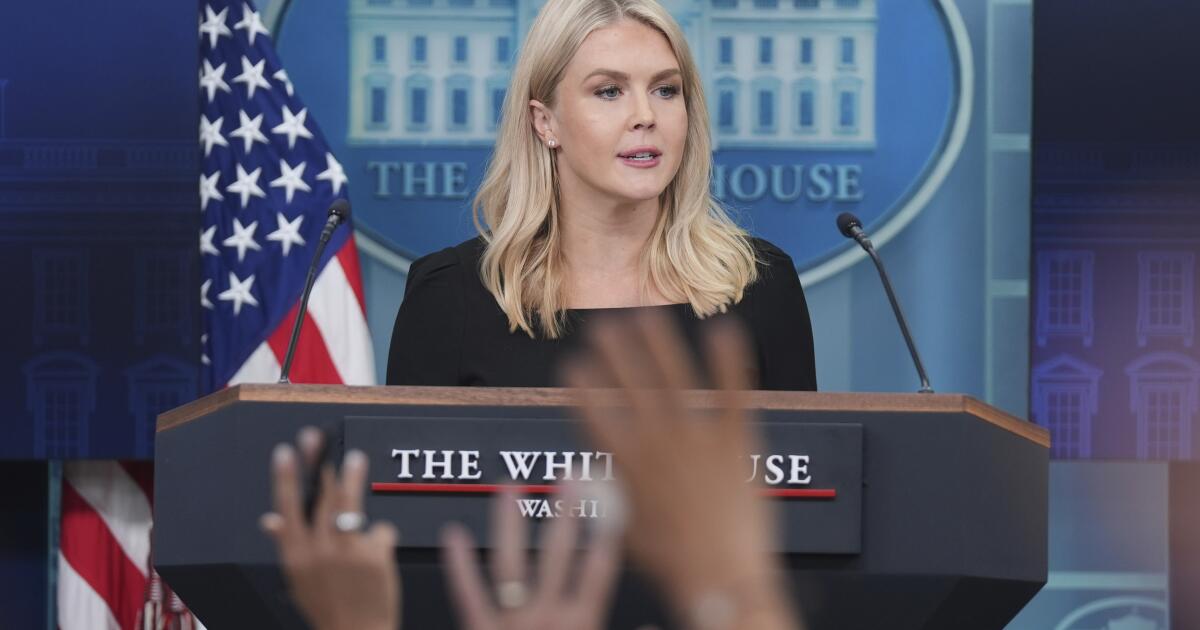Trump is silent about Juneteenth on a day he previously honored as president
WASHINGTON — President Trump honored Juneteenth in each of his first four years as president, even before it became a federal holiday. He even claimed once to have made it “famous.”
But on this year’s Juneteenth holiday on Thursday, the usually talkative president kept silent about a day important to Black Americans for marking the end of slavery in the country he leads again.
No words about it from his lips, on paper or through his social media site.
Asked whether Trump would commemorate Juneteenth in any way, White House Press Secretary Karoline Leavitt told reporters: “I’m not tracking his signature on a proclamation today. I know this is a federal holiday. I want to thank all of you for showing up to work. We are certainly here. We’re working 24/7 right now.”
Asked in a follow-up question whether Trump might recognize the occasion another way or on another day, Leavitt said, “I just answered that question for you.”
Trump’s silence was a sharp contrast from his prior acknowledgment of the holiday. Juneteenth celebrates the end of slavery in the United States by commemorating June 19, 1865, when Union soldiers brought the news of freedom to enslaved Black people in Galveston, Texas. Their freedom came more than two years after President Abraham Lincoln liberated slaves in the Confederacy by signing the Emancipation Proclamation during the Civil War.
Trump’s quiet on the issue also deviated from White House guidance that Trump planned to sign a Juneteenth proclamation. Leavitt didn’t explain the change. Trump held no public events Thursday, but he shared statements about Iran, the TikTok app and Fed chairman Jerome Powell on his social media site.
He had more to say about Juneteenth in yearly statements in his first term.
In 2017, Trump invoked the “soulful festivities and emotional rejoicing” that swept through the Galveston crowd when a major general delivered the news that all enslaved people were free.
He told the Galveston story in each of the next three years. “Together, we honor the unbreakable spirit and countless contributions of generations of African Americans to the story of American greatness,” he added in his 2018 statement.
In 2019: “Across our country, the contributions of African Americans continue to enrich every facet of American life.”
In 2020: “June reminds us of both the unimaginable injustice of slavery and the incomparable joy that must have attended emancipation. It is both a remembrance of a blight on our history and a celebration of our Nation’s unsurpassed ability to triumph over darkness.”
In 2020, after suspending his campaign rallies because of the COVID-19 pandemic, Trump chose Tulsa, Okla., as the place to resume his public gatherings, and scheduled a rally for June 19. But the decision met with such fierce criticism that Trump postponed the event by a day.
Black leaders had said it was offensive for Trump to choose June 19 and Tulsa for a campaign event, given the significance of Juneteenth and Tulsa being the place where, in 1921, a white mob looted and burned that city’s Greenwood district, an economically thriving area referred to as Black Wall Street. As many as 300 Black Tulsans were killed, and thousands were temporarily held in internment camps overseen by the National Guard.
In an interview with the Wall Street Journal days before the rally, Trump tried to put a positive spin on the situation by claiming that he had made Juneteenth “famous.” He said he changed the rally date out of respect for two African American friends and supporters.
“I did something good. I made it famous. I made Juneteenth very famous,” Trump said. “It’s actually an important event, it’s an important time. But nobody had heard of it. Very few people have heard of it.”
Generations of Black Americans celebrated Juneteenth long before it became a federal holiday in 2021 with the stroke of former President Joe Biden’s pen.
Later in 2020, Trump sought to woo Black voters with a series of campaign promises, including establishing Juneteenth as a federal holiday.
He lost the election, and that made it possible for Biden to sign the legislation establishing Juneteenth as the newest federal holiday.
Last year, Biden spoke briefly at a holiday concert on the South Lawn that featured performances by Gladys Knight and Patti LaBelle. Former Vice President Kamala Harris danced onstage with gospel singer Kirk Franklin.
Biden was spending this year’s holiday in Galveston, Texas, where he was set to speak at a historic African Methodist Episcopal church.
Superville writes for the Associated Press. AP writer Calvin Woodward contributed to this report.

